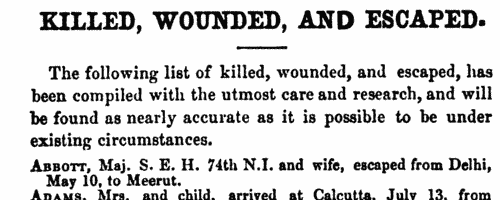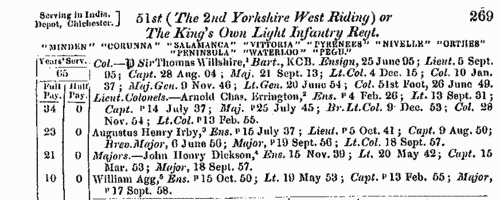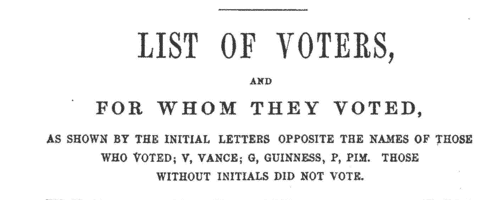Cavanagh Surname Ancestry ResultsOur indexes 1000-1999 include entries for the spelling 'cavanagh'. In the period you have requested, we have the following 214 records (displaying 61 to 70): Single Surname Subscription | | | Buying all 214 results of this search individually would cost £1,252.00. But you can have free access to all 214 records for a year, to view, to save and print, for £100. Save £1,152.00. More... |
These sample scans are from the original record. You will get scans of the full pages or articles where the surname you searched for has been found. Your web browser may prevent the sample windows from opening; in this case please change your browser settings to allow pop-up windows from this site.  Sailors and marines awarded the Baltic Medal
(1854-1857) Sailors and marines awarded the Baltic Medal
(1854-1857)
During the Crimean War, a British and French fleet entered the Baltic, and captured Bomarsund harbour and one of the Aland Islands (now part of Finland). Bomarsund is the sound between the islands and the Swedish island of Vardo; and at the fine harbour on Bomarsund, dominating the entrance of the Gulf of Bothnia, and indirectly that of the Gulf of Finland, the Russians had constructed a northern naval base, and this was destroyed in the attack. The British fleet taking part in the Baltic expedition comprised Her Majesty's ships Aeolus, Ajax, Alban, Algiers, Amphion, Archer, Arrogant, Basilisk, Belleisle, Blenheim, Boscawen, Bulldog, Caesar, Calcutta, Centaur, Colossus, Conflict, Cornwallis, Cossack, Cressy, Cruizer, Cuckoo, Cumberland, Dauntless, Desperate, Dragon, Driver, Duke of Wellington, Edinburgh, Esk, Euryalus, Exmouth, Falcon, Firefly, Geyser, Gladiator, Gorgon, Hannibal, Harrier, Hastings, Hawke, Hecla, Hogue, Imperieuse, James Watt, Leopard, Lightning, Locust, Magicienne, Majestic, Merlin, Miranda, Monarch, Neptune, Nile, Odin, Orion, Otter, Pembroke, Penelope, Pigmy, Porcupine, Prince Regent, Princess Royal, Pylades, Resistance, Retribution, Rhadamanthus, Rosamond, Royal George, Royal William, Russell, St George, St Jean D'Acre, St Vincent, Sphinx, Stromboli, Tartar, Termagant, Tribune, Tyne, Valorous, Volage, Volcano, Vulture, Wrangler and Zephyr. This is the medal roll of the naval and marine claimants who qualified for the Baltic Medal for service in 1854 to 1855. The medals were dispatched in batches from early 1857, the first batch being numbered B A 1, the next B A 2, &c.; then follows the destination (a place or, more usually, a ship) and the date of dispatch. Most of the medals had been sent by the end of 1857.CAVANAGH. Cost: £8.00.  | Sample scan, click to enlarge

| Indian Mutiny: Killed, Wounded and Escaped
(1857)
This list of casualties of the Indian Mutiny was published 17 September 1857.CAVANAGH. Cost: £4.00.  | Sample scan, click to enlarge

| Irish Bankrupts
(1857)
Bankruptcy notices for Ireland: bankruptcy often caused people to restart their lives elsewhere, so these are an important source for lost linksCAVANAGH. Cost: £6.00.  | Sample scan, click to enlarge

|  British infantry fighting in China
(1860) British infantry fighting in China
(1860)
The China Medal was awarded to soldiers and sailors who took part in the prosecution of the war against the Chinese from 1856 to 1860. Separate clasps were awarded for men who had been in receipt of the China Medal of 1842; for being actually present at Canton on 28 and 29 December 1857, when that city was bombarded and finally captured; for being actually engaged in the operations which ceased with the first capture of the Taku Forts, 20 May 1858, and led to the Treaty of Tientsin; for being actually present at the capture of the Taku Forts 21 August 1860; and for being actually present before Pekin the day the gate of that city was given up to the allied (British and French) army, viz. on 13 October 1860. The 99th (Lanarkshire) Regiment of Foot, based at Cork, embarked for India in September 1858, and was transferred to China in 1860; moved to South Africa in 1865, and returned to England in 1869. The regiment took part in the capture of Pekin.CAVANAGH. Cost: £8.00.  | Sample scan, click to enlarge

|  British infantry fighting in China
(1860) British infantry fighting in China
(1860)
The China Medal was awarded to soldiers and sailors who took part in the prosecution of the war against the Chinese from 1856 to 1860. Separate clasps were awarded for men who had been in receipt of the China Medal of 1842; for being actually present at Canton on 28 and 29 December 1857, when that city was bombarded and finally captured; for being actually engaged in the operations which ceased with the first capture of the Taku Forts, 20 May 1858, and led to the Treaty of Tientsin; for being actually present at the capture of the Taku Forts 21 August 1860; and for being actually present before Pekin the day the gate of that city was given up to the allied (British and French) army, viz. on 13 October 1860. The 1st battalion, the 3rd (East Kent) Regiment of Foot (the Buffs), based in Limerick, embarked for Malta 2 April 1851. The battalion took part on in the capture of the Taku Forts.CAVANAGH. Cost: £8.00.  | Sample scan, click to enlarge

|  Dragoon guards fighting in China
(1860) Dragoon guards fighting in China
(1860)
The China Medal was awarded to soldiers and sailors who took part in the prosecution of the war against the Chinese from 1856 to 1860. Separate clasps were awarded for men who had been in receipt of the China Medal of 1842; for being actually present at Canton on 28 and 29 December 1857, when that city was bombarded and finally captured; for being actually engaged in the operations which ceased with the first capture of the Taku Forts, 20 May 1858, and led to the Treaty of Tientsin; for being actually present at the capture of the Taku Forts 21 August 1860; and for being actually present before Pekin the day the gate of that city was given up to the allied (British and French) army, viz. on 13 October 1860. The 1st (The King's) Regiment of Dragoon Guards (based in Canterbury) returned from the Crimea in July 1856, embarked for India 24 August 1857, and from there was transferred to China. The regiment took part in the capture of the Taku Forts and that of Pekin.CAVANAGH. Cost: £8.00.  | Sample scan, click to enlarge

| Officers of the British Army
(1860)
The New Annual Army List first lists officers of the rank of major and above, by rank, and with dates of appointment to each successive higher rank, and (where appropriate) when placed on half pay. An asterisk indicates temporary rank; a superscript p shows that a commission was purchased; a dagger shows officers on the half pay of their last regimental commission. An ornate W indicates those officers actually present in any of the actions of 16, 17 or 18 June 1815 and therefore awarded the Waterloo Medal; P is put before the name of an officer who served in the Peninsula or the South of France; T for the Battle of Trafalgar; VC for the Victoria Cross. For each officer in this section, the final column notes his then present or immediately former regiment and/or office, if any. Next, all the officers of the army are listed, down to the rank of ensign, by regiment or corps, giving rank, name, date of rank in the regiment, and date of rank in the army, with occasional further notes. Again, holders of medals are duly noted, as in the first list. For each regiment the paymaster, adjutant, quartermaster, surgeon and assistant surgeons are named, as well as the civilian agent; and the regimental motto, battle honours, and colours of the facings and lace of the dress uniform are stated. After the British regiments of the line, the Rifle Brigade, the officers of the West India infantry, the Ceylon rifles, the Cape Mounted Riflemen, the Royal Canadian Rifles, St Helena Regiment and the Gold Coast Artillery Corps are given; then the officers of the garrisons and other military establishments; the Royal Artillery; Royal Engineers; Royal Marines; Commissariat Department; Medical Department; Staff Officers of Pensioners; Chaplains' Department; Staff (of Great Britain, Australia, Bahamas, Bermuda, British Columbia, Cape of Good Hope, Ceylon, East Indies, Falkland Islands, Gibraltar, Heligoland, Hong Kong, Ionian Islands, Jamaica (including Honduras), Malta, Mauritius, Newfoundland, North America, St Helena, the Western Coast of Africa, and the Windward and Leeward Islands); Military and Civil Department; and Barrack Masters. Then there is a separate list of officers retained on retired full pay and half pay (including the German Legion, the Brunswick Cavalry, the Brunswick Infantry, Chasseurs Brittaniques, Royal Corsican Rangers, the Greek Light Infantry, Royal Malta Regiment, Meuron's Regiment, Roll's Regiment, Sicilian Regiment, Watteville's Regiment, the York Light Infantry Volunteers, Foreign Veteran Battalion and the Foreign Corps of Waggoners).CAVANAGH. Cost: £4.00.  | Sample scan, click to enlarge

| Patentees of New Inventions
(1860)
Abstracts of British patents for new inventions applied for and granted from 1 January to 31 December 1860: giving date, name and address, and short description of the invention. It is then stated whether 'Letters patent sealed' or 'Provisional protection only'.CAVANAGH. Cost: £6.00.  | Sample scan, click to enlarge

|  Sailors and marines on board Her Majesty's ship Imperieuse
(1860) Sailors and marines on board Her Majesty's ship Imperieuse
(1860)
The China Medal was awarded to soldiers and sailors involved in the various actions of the war against China, in which this ship was engaged in 1860. The medals were either delivered on board or sent on in 1862: except that many of the men were no longer immediately traceable, and the remarks on the roll show that some medals were not sent on for several years, and some were never sent. After the main roll there is a section showing which of the men also qualified for clasps. Separate clasps were awarded for men who had been in receipt of the China Medal of 1842; for the taking of Fatshan in 1857, Canton in 1857, Taku Forts in 1858, Taku Forts in 1860, and Pekin in 1860. Most of the men on this ship are shown as having been given the Taku Forts 1860 clasp, for being actually present at the capture of the Taku Forts 21 August 1860; and the Pekin clasp, for being actually present before Pekin the day the gate of that city was given up to the allied (British and French) army, viz. on 13 October 1860.CAVANAGH. Cost: £8.00.  | Sample scan, click to enlarge

| Dublin Electors
(1865)
This alphabetical list of electors for the City of Dublin for 1865 is annotated with details of the votes cast in the election of 15 July 1865 for a member of Parliament. The candidates were John Vance, Esq., D. L. (V), Benjamin Lee Guinness, Esq., D. L., LL. D. (G), and Jonathan Pim, Esq. (P). The first column gives, in bold, the initial of the ward in which lay the property that was the elector's qualification. The second column gives the elector's sequential number (alphabetically) within that ward. Then the elector's full name is given, surname first, and address, usually including house number. The votes cast are shown on the right: where these columns are blank, the elector did not vote. The key to the ward names is: A, South Dock; B, Donnybrook; C, Rathdown; D, Trinity; E, South City; F, Royal Exchange; G, Mansion House; H, Fitzwilliam; I, Wood Quay; K, Merchants' Quay; L, Usher's Quay; M, Arran Quay; N, Inns' Quay; O, North City; P, Rotundo; Q, Mountjoy; R; North Dock. S indicates the register of freemen.CAVANAGH. Cost: £4.00.  | Sample scan, click to enlarge

|
Research your ancestry, family history, genealogy and one-name study by direct access to original records and archives indexed by surname.
|













